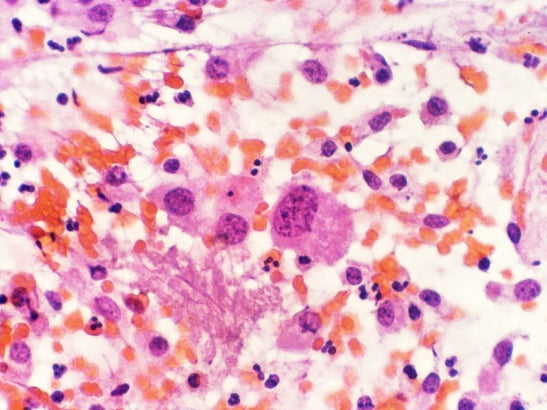.tmb-0874x492.jpg?sfvrsn=1)
Image: A small, hypolobated megakaryocyte in a bone marrow aspirate, typical of chronic myelogenous leukemia. (Credit: Difu Wu/CC BY-SA 3.0)
A gene which is overactive in some cases of myeloma has been linked, for the first time, with more aggressive forms of the disease.
Scientists at The Institute of Cancer Research, London, studied data from nearly 1,500 patients with myeloma, which showed that people with high EZH2 expression levels did not live as long and were less likely to continue to respond to treatment, compared with patients whose expression levels were lower.
They also found that blocking the activity of EZH2 in myeloma tumour samples caused changes to the expression of cell cycle control genes, reducing cell division and leading to cell death.
The findings suggest EZH2 plays a key role in the most lethal forms of myeloma, and that targeting the gene could be an effective treatment for the disease when other therapies do not work.
Reducing cell viability
The study, which was published in the published in the Blood Cancer Journal, was funded by The Wellcome Trust, Myeloma UK and Cancer Research UK, with support from the NIHR Biomedical Research Centre at The Royal Marsden NHS Foundation Trust and the ICR.
Mutations in the EZH2 gene are found in a range of cancers. Whilst this is not the case in myeloma there is evidence that EZH2 still plays a role in this disease, where changes to gene expression levels are associated with tumour development.
High expression levels of EZH2 in myeloma were associated with shorter survival times on average compared with patients who displayed lower expression levels, regardless of the treatment patients received.
The researchers used two different small-molecule compounds to inhibit EZH2 in myeloma cells, donated by relapsing patients treated at The Royal Marsden, and they saw that both reduced cell viability.
Inhibiting EZH2 caused genes that control the cell division cycle to be upregulated in myeloma, which stopped cell division and led to cell death.
Research at the ICR is underpinned by generous contributions from our supporters. Find out more about how you can contribute to our mission to make the discoveries to defeat cancer.
Effective therapuetic strategy for patients
First author Dr Charlotte Pawlyn, NIHR Clinical Lecturer at the ICR and Haematologist at The Royal Marsden Hospital, said:
“Myeloma treatments over the past couple of decades have improved outcomes for many patients with the disease but they have not been very effective for patients with the most aggressive forms of myeloma.
“We have shown for the first time that EZH2 overexpression is associated with worse outcomes for patients with myeloma. Our study demonstrates that EZH2 inhibition may be an effective therapeutic strategy for these patients, potentially even for those with high-risk disease.”
